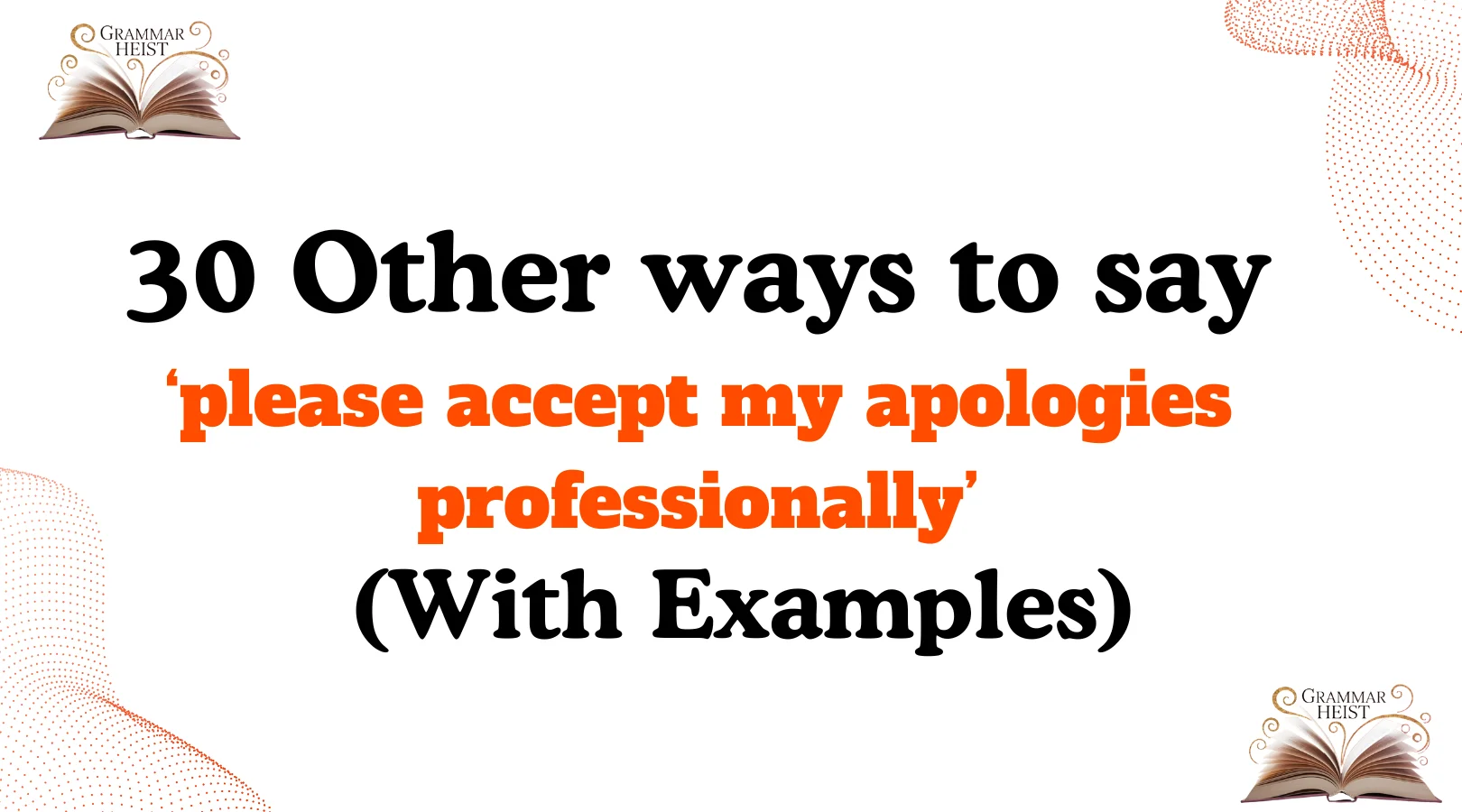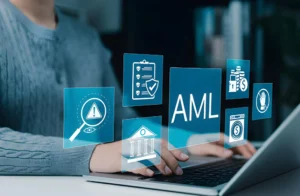Finding the right words to apologize can make all the difference in building trust, preserving respect, and showing sincerity. Sometimes, the phrase “please accept my apologies professionally” can feel too formal or overused. That’s why exploring alternative expressions helps us communicate care and professionalism with a touch of empathy. Below, you’ll find 30 thoughtful alternatives, each with scenarios, examples, and explanations to guide your wording.
What Does “please accept my apologies professionally” Mean?
The phrase “please accept my apologies professionally” is a polite request for forgiveness, often used in formal or work-related situations. It shows that the person is acknowledging a mistake and wishes to handle it with professional courtesy and respect.
Is It Professional/Polite to Say “please accept my apologies professionally”?
Yes, it is both professional and polite. However, it can sometimes come across as stiff or distant. In certain contexts, warmer or more tailored wording can make the apology feel more personal, genuine, and meaningful.
Pros or Cons
Pros:
- Sounds formal and respectful
- Works in official or professional situations
- Shows accountability
Cons:
- Can feel too rigid
- Might lack warmth and empathy
- Sometimes doesn’t connect emotionally with the receiver
Synonyms For please accept my apologies professionally
- I sincerely apologize
- I regret the inconvenience
- My apologies for the oversight
- I take full responsibility
- I owe you an apology
- I regret my mistake
- I’m sorry for the confusion
- I apologize unreservedly
- Forgive me for the error
- I appreciate your understanding
- Please pardon the mistake
- I apologize for the delay
- I regret the misunderstanding
- I accept responsibility
- I apologize if this caused concern
- Please excuse the oversight
- I am sorry for my lapse
- Kindly accept my regret
- I apologize for any disruption
- I’m sorry for falling short
- I regret the error
- I apologize for my part in this
- I am deeply sorry
- My apologies for the lapse
- I’m sorry for letting this happen
- I apologize if I caused frustration
- Please forgive my mistake
- I’m sorry for the mix-up
- I apologize sincerely
- I assure you it won’t happen again
1. I sincerely apologize
Scenario: When you want to emphasize genuine regret in a professional tone.
Examples:
- I sincerely apologize for the delay in my response.
- I sincerely apologize if my actions caused any confusion.
- I sincerely apologize for any inconvenience this may have created.
Tone: Professional yet warm.
Explanation: This phrase adds a touch of sincerity while maintaining formality.
2. I regret the inconvenience
Scenario: Ideal when acknowledging delays, mistakes, or issues affecting others.
Examples:
- I regret the inconvenience this error has caused your team.
- I regret the inconvenience and appreciate your understanding.
- I regret the inconvenience, and we’re taking steps to prevent recurrence.
Tone: Respectful, empathetic.
Explanation: Shows concern for the other person’s experience while taking accountability.
3. My apologies for the oversight
Scenario: When you want to acknowledge a mistake politely.
Examples:
- My apologies for the oversight in the report.
- My apologies for not clarifying earlier.
- My apologies for the oversight on this matter.
Tone: Polite and professional.
Explanation: This phrase keeps things formal and neutral, suitable for business communication.
4. I take full responsibility
Scenario: When accountability is crucial.
Examples:
- I take full responsibility for the delay.
- I take full responsibility for the misunderstanding.
- I take full responsibility and will correct this immediately.
Tone: Strong and direct.
Explanation: This phrase shows ownership and maturity, enhancing trust.
5. I owe you an apology
Scenario: Best for one-on-one professional relationships.
Examples:
- I owe you an apology for missing yesterday’s call.
- I owe you an apology for not updating you sooner.
- I owe you an apology for my miscommunication.
Tone: Personal yet polite.
Explanation: Sounds genuine and humble, making the apology more personal.
6. I regret my mistake
Scenario: When addressing errors with humility.
Examples:
- I regret my mistake in the calculations.
- I regret my mistake and appreciate your patience.
- I regret my mistake and will ensure it does not happen again.
Tone: Honest and accountable.
Explanation: Acknowledges the error while showing self-awareness.
7. I’m sorry for the confusion
Scenario: Perfect for miscommunications.
Examples:
- I’m sorry for the confusion caused by my earlier message.
- I’m sorry for the confusion during the meeting.
- I’m sorry for the confusion about the schedule.
Tone: Gentle and considerate.
Explanation: Softens the mistake by focusing on clarity and resolution.
8. I apologize unreservedly
Scenario: When a serious or formal apology is needed.
Examples:
- I apologize unreservedly for the oversight.
- I apologize unreservedly for the disruption.
- I apologize unreservedly for the error and take full responsibility.
Tone: Formal, strong.
Explanation: Expresses deep seriousness and formality.
9. Forgive me for the error
Scenario: Useful for formal yet slightly personal interactions.
Examples:
- Forgive me for the error in the document.
- Forgive me for the misstep in handling this matter.
- Forgive me for the delay in addressing your request.
Tone: Respectful and humble.
Explanation: Adds a touch of personal warmth while remaining professional.
10. I appreciate your understanding
Scenario: When balancing apology with gratitude.
Examples:
- I appreciate your understanding as we correct this.
- I appreciate your understanding regarding the delay.
- I appreciate your understanding as I take responsibility.
Tone: Appreciative and positive.
Explanation: Shifts focus toward mutual respect and patience.
11. Please pardon the mistake
Scenario: When you want to politely ask for forgiveness in a respectful way.
Examples:
- Please pardon the mistake in the attached file.
- Please pardon the mistake; it was unintentional.
- Please pardon the mistake and thank you for your patience.
Tone: Courteous and professional.
Explanation: This phrase emphasizes respect and humility, suitable for formal settings.
12. I apologize for the delay
Scenario: Best when your response, task, or action was late.
Examples:
- I apologize for the delay in sending the proposal.
- I apologize for the delay in addressing your concern.
- I apologize for the delay; we’re now back on track.
Tone: Direct yet polite.
Explanation: Simple, clear, and acknowledges time sensitivity.
13. I regret the misunderstanding
Scenario: When clarifying miscommunications.
Examples:
- I regret the misunderstanding regarding the deadline.
- I regret the misunderstanding and appreciate your patience.
- I regret the misunderstanding and will clarify right away.
Tone: Empathetic and considerate.
Explanation: Focuses on clearing confusion without blame-shifting.
14. I accept responsibility
Scenario: When accountability is the most important message.
Examples:
- I accept responsibility for the error in our report.
- I accept responsibility and will ensure corrective action.
- I accept responsibility for the oversight in communication.
Tone: Serious and professional.
Explanation: This phrase highlights maturity, integrity, and leadership.
15. I apologize if this caused concern
Scenario: When you want to address potential unease.
Examples:
- I apologize if this caused concern regarding the project.
- I apologize if this caused concern for your schedule.
- I apologize if this caused concern, and I’m here to resolve it.
Tone: Gentle and empathetic.
Explanation: A polite way to acknowledge impact without assuming offense.
16. Please excuse the oversight
Scenario: When the mistake is small but needs acknowledgment.
Examples:
- Please excuse the oversight in formatting.
- Please excuse the oversight; it won’t happen again.
- Please excuse the oversight and thank you for pointing it out.
Tone: Humble and professional.
Explanation: Works well for minor errors while maintaining respect.
17. I am sorry for my lapse
Scenario: When the issue is due to forgetting or missing something.
Examples:
- I am sorry for my lapse in communication.
- I am sorry for my lapse in judgment during the discussion.
- I am sorry for my lapse in not following up sooner.
Tone: Honest and personal.
Explanation: Highlights awareness of personal responsibility.
18. Kindly accept my regret
Scenario: A more formal alternative for professional letters.
Examples:
- Kindly accept my regret for the oversight.
- Kindly accept my regret for the inconvenience caused.
- Kindly accept my regret, and I assure it won’t repeat.
Tone: Formal, polished
Explanation: Sounds polite and dignified, good for written apologies.
19. I apologize for any disruption
Scenario: When your mistake interrupted progress or workflow.
Examples:
- I apologize for any disruption during the meeting.
- I apologize for any disruption caused by my delay.
- I apologize for any disruption to your schedule.
Tone: Respectful and considerate.
Explanation: Works best in team or organizational contexts.
20. I’m sorry for falling short
Scenario: When you didn’t meet expectations.
Examples:
- I’m sorry for falling short of your expectations.
- I’m sorry for falling short in delivering on time.
- I’m sorry for falling short, and I’ll strive to do better.
Tone: Humble, self-aware.
Explanation: Conveys commitment to improvement.
21. I regret the error
Scenario: General but respectful acknowledgment of mistakes.
Examples:
- I regret the error in the data.
- I regret the error and appreciate your understanding.
- I regret the error and will take steps to correct it.
Tone: Professional, neutral.
Explanation: Simple yet effective in formal situations.
22. I apologize for my part in this
Scenario: When responsibility is shared but you still want accountability.
Examples:
- I apologize for my part in the miscommunication.
- I apologize for my part in the delay.
- I apologize for my part in the confusion.
Tone: Respectful and fair.
Explanation: Shows team spirit and accountability without deflecting.
23. I am deeply sorry
Scenario: When expressing strong remorse.
Examples:
- I am deeply sorry for missing the deadline.
- I am deeply sorry for the oversight.
- I am deeply sorry for any inconvenience caused.
Tone: Emotional yet professional.
Explanation: Stronger than “sorry,” adds weight to sincerity.
24. My apologies for the lapse
Scenario: When you missed a responsibility.
Examples:
- My apologies for the lapse in judgment.
- My apologies for the lapse in scheduling.
- My apologies for the lapse; I will rectify it.
Tone: Polite, professional.
Explanation: Works best for formal or semi-formal apologies.
25. I’m sorry for letting this happen
Scenario: When you want to emphasize accountability.
Examples:
- I’m sorry for letting this happen under my supervision.
- I’m sorry for letting this happen, and I’ll address it.
- I’m sorry for letting this happen, and I take responsibility.
Tone: Humble and serious.
Explanation: Adds a sense of ownership and leadership accountability.
26. I apologize if I caused frustration
Scenario: When emotions may have been affected.
Examples:
- I apologize if I caused frustration with my oversight.
- I apologize if I caused frustration during our discussion.
- I apologize if I caused frustration through the delay.
Tone: Empathetic and thoughtful.
Explanation: Recognizes emotional impact as well as practical.
27. Please forgive my mistake
Scenario: When humility is the best approach.
Examples:
- Please forgive my mistake in the report.
- Please forgive my mistake; it was unintended.
- Please forgive my mistake and thank you for understanding.
Tone: Humble, soft.
Explanation: Sounds genuine and heartfelt, especially in one-to-one contexts.
28. I’m sorry for the mix-up
Scenario: Ideal for small errors or misunderstandings.
Examples:
- I’m sorry for the mix-up with the schedule.
- I’m sorry for the mix-up in communication.
- I’m sorry for the mix-up and any confusion caused.
Tone: Light, casual-professional.
Explanation: Keeps things friendly but still accountable.
29. I apologize sincerely
Scenario: A more formal reinforcement of sincerity.
Examples:
- I apologize sincerely for the mistake.
- I apologize sincerely for the inconvenience.
- I apologize sincerely for not following through.
Tone: Strong and heartfelt.
Explanation: Puts extra weight on your apology.
30. I assure you it won’t happen again
Scenario: Best for serious mistakes requiring reassurance.
Examples:
- I assure you it won’t happen again, and I take full responsibility.
- I assure you it won’t happen again moving forward.
- I assure you it won’t happen again; corrective measures are in place.
Tone: Responsible and reassuring.
Explanation: Combines apology with a promise of improvement.
Conclusion
Using different ways to apologize professionally allows you to adjust your tone depending on the situation — whether it’s a formal email, team communication, or personal acknowledgment. Words like “I take full responsibility” or “I assure you it won’t happen again” show accountability, while phrases like “I sincerely apologize” or “I regret the inconvenience” add empathy. The goal is to make your apology professional yet human, showing that you care enough to make things right.

Mia Rose is a skilled language expert with a deep passion for helping individuals master the art of writing and communication. With years of experience in the field, Marie brings a thoughtful and tailored approach to grammar, style, and language improvement. Her goal is to empower others to express themselves with clarity, precision, and confidence in every written word.













